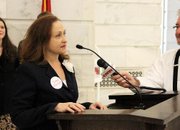Arkansas Attorney General Leslie Rutledge wants all of the judges on the 8th U.S. Circuit Court of Appeals to hear the state's arguments for a law banning abortions after 12 weeks.
A three-judge panel of the same court rejected the state law as unconstitutional two weeks ago.
Rutledge announced Wednesday that she has filed a petition asking for the full-court rehearing of the 2013 Arkansas Human Heartbeat Protection Act, which is the second-most restrictive abortion law in the nation.
"I have and will continue to be a strong advocate for the unborn," Rutledge said in a news release. "The Arkansas Human Heartbeat Protection Act, which prohibits abortions after 12 weeks when a heartbeat is detected, was passed by lawmakers ... and it is my duty to defend this law. I believe that the State's appeal is entitled to a full hearing before the entire Eighth Circuit and not just a three-judge panel."
U.S. District Judge Susan Webber Wright struck down the time-limit portion of the law in March 2014, ruling that it violated legal precedent that permits abortions until the fetus is viable, or capable of living independently outside the womb.
Medical advances have made viability attainable at earlier points in a pregnancy, but not at 12 weeks. Typically, a fetus can survive independently at 24 to 28 weeks.
Abortion opponents have won legislative support in Arkansas and other states for laws that ban or restrict abortions once a fetal heartbeat can be detected via an ultrasound or other methods.
Rita Sklar, head of the Arkansas chapter of the American Civil Liberties Union, said she was "not totally" surprised by Rutledge's decision and thought it was foolhardy. The ACLU was one of the first groups to challenge the law's constitutionality.
"It is a futile attempt and more of a waste to taxpayers' money," Sklar said. "The ban is uncategorically unconstitutional."
Democratic Gov. Mike Beebe's veto of the bill creating the law was overridden by the Legislature.
A pair of abortion providers, backed by the ACLU and the Center for Reproductive Rights, challenged the law before its effective date of August 2013, and Wright signed off on a preliminary injunction, preventing its enforcement.
In her March 2014 ruling, Wright found that the section of the Arkansas Human Heartbeat Protection Act that prohibited abortions after 12 weeks that weren't the result of rape, incest, or that threatened the mothers's life were unconstitutional by halving the standard for a fetus's viability.
In the landmark 1973 case, Roe v. Wade, the U.S. Supreme Court established that a woman has a right to an abortion until a fetus is viable.
Wright did not rule on other components of the Arkansas law, which required a woman considering an abortion to have an ultrasound as well as consult with a doctor about the fetus's likelihood of survival if brought to term.
State attorneys appealed Wright's ruling.
On Jan. 13, a three-judge federal appeals panel heard oral arguments.
On May 27, the judges noted in their opinion that attorneys with Rutledge's office provided no evidence indicating that a fetus is viable at 12 weeks.
The three judges pointed out that the only evidence involved in the case came from physician who said that viability was impossible at 12 weeks.
Assistant Attorney General Colin Jorgenson argued in Wednesday's filing for the "en banc" hearing that the appeals court panel erred in its interpretation of existing precedent, pointing out that the 8th Circuit itself struck down a law prohibiting pre-viability abortion procedures.
That ruling was overturned by the U.S. Supreme Court, Jorgenson noted, and then argued that the state's ban doesn't prevent women from seeking an abortions before 12 weeks.
Jorgenson argued that advances in prenatal care have advanced viability and that the abortion laws should be a balance of a woman's rights and the rights of the state to protect the lives of children.
By his reasoning, the law does not violate a woman's constitutional right to abortion because an abortion can be obtained before 12 weeks.
He also argued that the state's 20-week ban that is in effect would mean that the 12-week ban would shorten the window by only eight weeks.
Rutledge spokesman Judd Deere was unable to comment beyond Wednesday's filing.
Sklar said she was confident that if a full rehearing were held, the result would be the same.
"[The judges] reiterated the fact that their decision was based on Supreme Court precedent and that basically left them no choice but to find it unconstitutional," Sklar said.
A Section on 06/11/2015

